初中英语同义句转换精析
初中英语语法——句型转换之同义句

初中英语语法——句型转换之同义句(注意:修改顺序)同义句转换是句型转换题型中一种非常重要的形式。
所谓同义句转换,是指用不同的词汇、短语及句型表示相同或相近的意思。
它是中考命题的一大热点。
现将常见的同义句转换形式作一归纳,以期对同学们的中考复习有所帮助。
一、用同义词(组)或近义词(组)改写。
1. The children are wearing beautiful clothes.The children are _________beautiful clothes.2. Every day, Yao Ming receives E-mails from thousands of basketball fans.Every day,Yao Ming _________thousands of basketball fans.3. Mr. Smith is working.Mr. Smith is__________ __________.答案:1. in 2. hears from 3. at work简析:英语中有不少同义、近义词(组),在平时学习中要注意总结归纳。
如:enjoy oneself/have a good time, look after/take care of,difficult/hard, can/be able to,over/more than,receive(get)a letter from/hear from等等。
二、用反义词(组)改写。
4. Chinese is more popular than Japanese.Japanese is __________ popular __________ Chinese.5. The runner couldn't catch up with the others in the race.The runner _________ __________ the others in the race.6. A computer is more useful than a VCD.A VCD is not _________useful _________a computer.答案:4. less, than 5. fell behind 6. as,as简析:此类转换应注意有时主语位置会改变,并要特别总结归纳反义词(组)。
初中英语同义句转换精析
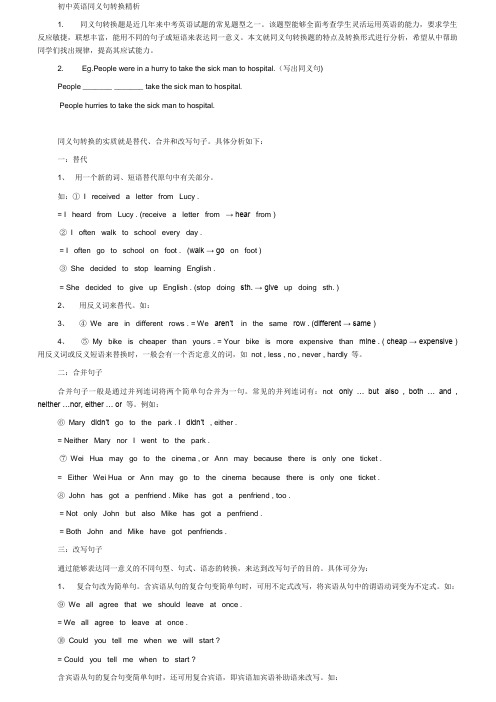
初中英语同义句转换精析1. 同义句转换题是近几年来中考英语试题的常见题型之一。
该题型能够全面考查学生灵活运用英语的能力,要求学生反应敏捷,联想丰富,能用不同的句子或短语来表达同一意义。
本文就同义句转换题的特点及转换形式进行分析,希望从中帮助同学们找出规律,提高其应试能力。
2. Eg.People were in a hurry to take the sick man to hospital.(写出同义句)People _______ _______ take the sick man to hospital.People hurries to take the sick man to hospital.同义句转换的实质就是替代、合并和改写句子。
具体分析如下:一:替代1、用一个新的词、短语替代原句中有关部分。
如:①I received a letter from Lucy .= I heard from Lucy . (receive a letter from → hear from )②I often walk to school every day .= I often go to school on foot . (walk → go on foot )③She decided to stop learning English .= She decided to give up English . (stop doing sth. → give up doing sth. )2、用反义词来替代。
如:3、④We are in different rows . = We aren’t in the same row . (different → same )4、⑤My bike is cheaper than yours . = Your bike is more expensive than mine . ( cheap → expensive ) 用反义词或反义短语来替换时,一般会有一个否定意义的词,如not , less , no , never , hardly 等。
九年级复习--同义句转换技巧

中考英语同义句转换题型解题技巧同义句转换是英语句型转换的一种重要形式,也是中考命题的一个热点。
该题型主要考查同学们对英语词汇、句型的掌握情况和灵活运用的能力。
其特点是涉及面广、语言点多、方式灵活、要求较高、难度较大。
为了帮助同学们掌握一些同义句转换题型解题技巧,现将常见的同义句转换形式作一归纳:一、用同义词(近义词)或词组改写做此题型时,我们可以采用“词语替代法”,此法是指用词性相同的同义词、近义词或同义词组对原句的某些成分进行简单的替代,而句子结构保持不变。
因此,我们在学习过程中要掌握尽可能多的同义词(组),如:be able to,can;arrive in(at),reach,get to;be good at,do well in;have a good time,enjoy oneself;look after,take care of;over,more than等等。
具体运用时,还要注意它们在句中的位置,形式与转换后句中其他部分的相应变化。
例如:1.Every day,Wang Zhizhi receives emails from thousands of basketball fans.Every day,Wang Zhizhi _______ _______ thousands of basketball fans.2.They will get to London in four days.They will _______ _______ London in four days.答案:1.hears from 2.arrive in二、运用反义词或词组改写英语中有些反义词(组)具有非此即彼的排它性。
因此其否定式与其对应的反义词(组)同义。
如:same与different ,not same= different ,not different=same ,所以此类反义词(组)的否定式可以用于同义转换。
同义句英语转换语法

同义句英语转换语法
同义句英语转换语法:
所谓同义句转换就是将一个句子用另一种形式表达出来,而且意思不变。
用具有相同意思的词或词组进行转换。
例:She has a good time in Wuhan.她在武汉玩得很开心。
转换:She enjoys herself in Wuhan.她在武汉玩得很开心。
例:He spends some money on books every week.他每周都花一些钱买书。
转换:He pays some money to buy books every week.他每周花一些钱买书。
借助于反义词或反义词组进行转换。
例:l can't run as fast as my brother.我不能和我哥哥跑得一样快。
转换:l run more slowly than my brother.我跑得比我哥哥慢。
My brother runs faster than l.我哥哥跑得比我快。
例:He is not old enough to go to school.他还没到上学的年龄。
转换:He is too young to go to school.他太小了,不能去上学。
词语的理解和运用
这里是指:由于词性不同,但所表达的意思相同的句型变换。
例:We often go to school on foot.我们经常步行去上学。
转换:We often walk to school.我们经常步行去学校。
初中英语语法——句型转换之同义句
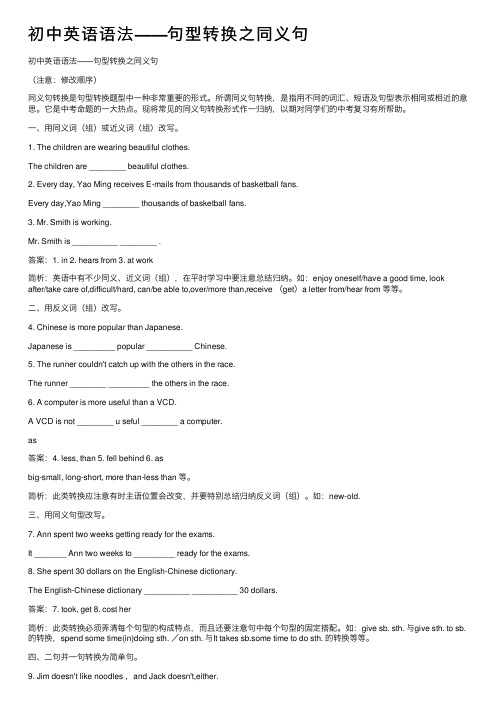
初中英语语法——句型转换之同义句初中英语语法——句型转换之同义句(注意:修改顺序)同义句转换是句型转换题型中⼀种⾮常重要的形式。
所谓同义句转换,是指⽤不同的词汇、短语及句型表⽰相同或相近的意思。
它是中考命题的⼀⼤热点。
现将常见的同义句转换形式作⼀归纳,以期对同学们的中考复习有所帮助。
⼀、⽤同义词(组)或近义词(组)改写。
1. The children are wearing beautiful clothes.The children are ________ beautiful clothes.2. Every day, Yao Ming receives E-mails from thousands of basketball fans.Every day,Yao Ming ________ thousands of basketball fans.3. Mr. Smith is working.Mr. Smith is __________ ________ .答案:1. in 2. hears from 3. at work简析:英语中有不少同义、近义词(组),在平时学习中要注意总结归纳。
如:enjoy oneself/have a good time, look after/take care of,difficult/hard, can/be able to,over/more than,receive (get)a letter from/hear from 等等。
⼆、⽤反义词(组)改写。
4. Chinese is more popular than Japanese.Japanese is _________ popular __________ Chinese.5. The runner couldn't catch up with the others in the race.The runner ________ _________ the others in the race.6. A computer is more useful than a VCD.A VCD is not ________ u seful ________ a computer.as答案:4. less, than 5. fell behind 6. asbig-small, long-short, more than-less than 等。
句型转换之同意句
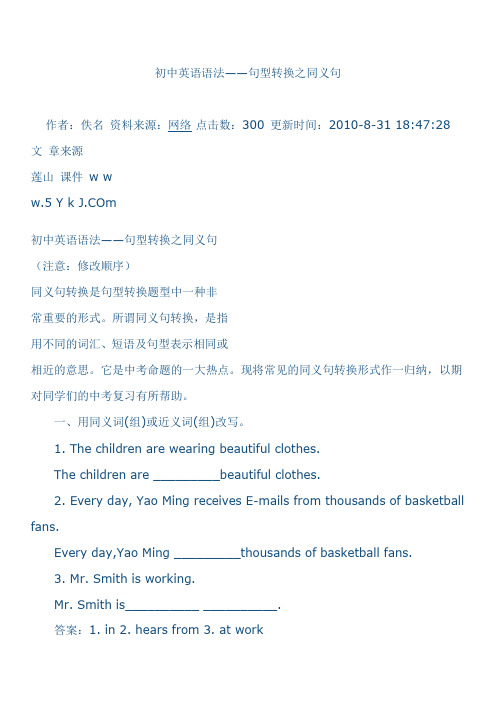
初中英语语法——句型转换之同义句作者:佚名资料来源:网络点击数:300 更新时间:2010-8-31 18:47:28文章来源莲山课件w ww.5 Y k 初中英语语法——句型转换之同义句(注意:修改顺序)同义句转换是句型转换题型中一种非常重要的形式。
所谓同义句转换,是指用不同的词汇、短语及句型表示相同或相近的意思。
它是中考命题的一大热点。
现将常见的同义句转换形式作一归纳,以期对同学们的中考复习有所帮助。
一、用同义词(组)或近义词(组)改写。
1. The children are wearing beautiful clothes.The children are _________beautiful clothes.2. Every day, Yao Ming receives E-mails from thousands of basketball fans.Every day,Yao Ming _________thousands of basketball fans.3. Mr. Smith is working.Mr. Smith is__________ __________.答案:1. in 2. hears from 3. at work简析:英语中有不少同义、近义词(组),在平时学习中要注意总结归纳。
如:enjoy oneself/have a good time, look after/take care of,difficult/hard, can/be able to,over/more than,receive(get)a letter from/hear from等等。
二、用反义词(组)改写。
4. Chinese is more popular than Japanese.Japanese is __________ popular __________ Chinese.5. The runner couldn't catch up with the others in the race.The runner _________ __________ the others in the race.6. A computer is more useful than a VCD.A VCD is not _________useful _________a computer.答案:4. less, than 5. fell behind 6. as,as简析:此类转换应注意有时主语位置会改变,并要特别总结归纳反义词(组)。
英语 经典同义句转换

同义句转换是英语学习中的一项重要技能。
通过将句子转换为与之意思相近但表达形式不同的句子,可以扩大我们的语言表达能力,提高英语写作和口语表达的准确性。
下面将介绍几种常见的同义句转换方法。
1.同义词替换法:将原句中的词汇用与之意思相近但不完全相同的词汇进行替换,从而达到同义转换的效果。
例如:The car is expensive. → The car is pricy. 2.反义句转换:通过将原句中的句子结构反转,达到表达相反意义的效果。
例如:He ran fast. → Fast he ran.3.从定向状转换:将原句中的状语从位置调整到句首或句尾,从而改变原句的语气。
例如:He usually goes to the gym. → Usually he goes to the gym.4.被动语态转换:将原句中的主动语态转换为被动语态,或将被动语态转换为主动语态,改变句子的语序和语态。
例如:The book was written by him. → He wrote the book.5.同位语转换:将原句中的同位语从位置调整到句首或句尾,达到重复和强调的效果。
例如:John, my best friend, is coming. → My best friend, John, is coming.通过掌握这些同义句转换的技巧,我们能够更灵活地运用英语表达,提高语言的表达效果。
在实践中,我们应该多加练习,积累更多的句型和词汇,以便在写作和口语交流中能够游刃有余地运用同义句转换的技巧,提升自己的英语水平。
希望以上内容能够帮助到您,提升您的英语学习水平。
在学习过程中,不断积累和实践才是取得进步的关键。
祝您学业进步,英语水平不断提高!。
中考英语同义词转换“十二类型”知识精讲

中考英语同义词转换“十二类型”知识精讲同义句转换题近几年被全国各地中考英语试题广泛采用,为必考题型之一。
它属于句型转换题,但要求不能改变句子意思,即依据给出的句子,通过以词、词组、句式、语法的改变及换句来改写句子,且转换前后的句意应保持一致。
从某种意义上讲,同义句也就是一句多译。
日常学习过程中,必须加强一句多译的总结训练,注重转换的思路和方法,提高同义句转换的能力。
下面就总结归纳一下同义句转换的十二种类型:【类型一】运用同义词或同义词组替换原句的有关部分。
【解题要领】将原句中的某些词或词组,用其同义词或同义词组进行替换改变,这是同义句转换使用最多的类型。
在英语新教材中,同义词或词组的运用非常广泛,学习过程中要尽可能多地去归纳总结,以达到熟能生巧,举一反三的程度。
【经典例句】1、他擅长绘画。
He is good at drawing./He does well in drawing.2、今天风很大。
There is a strong wind today./It's very windy today.3、明天我们将乘飞机去东京。
Tomorrow we will go to Tokyo by air./Tomorrow we will fly to Tokyo.4、王先生在六点钟到达了火车站。
Mr Wang reached /got to /arrived at the railway station at six.5、这本书花了我10元钱。
I spent ten yuan on the book./I paid ten yuan for the book./The book cost me ten yuan.【直击中考】1.She got a letter from her penfriend last week.(2002某某省)She________ _________ her penfriend last week.2.Linda likes music better than art.(2002呼和浩特市)Linda________music ________ art.3.They enjoyed themselves at the garden party.(2002某某市)They________ ________ ________ ________at the garden party.4.The Smiths teach themselves Chinese after work.(2002聊城市)The Smiths ________ Chinese ________ themselves after work.【类型二】运用反义词或词组改写原句有关部分。
中考英语同义句转换方法归类及相关练习

中考英语同义句转换方法归类及相关练习总所周知,语言是思想、情感交流的载体。
相同的意思有时可以用不同的方式表达。
了解并学会多种表达法,能更好地适应交际的需要。
同义句转换也是中考常考题型。
此类题型考生失分较大。
现归纳以下解题方法与思路。
一、运用同义词或同义词组e.g. 1. I got a letter from my brother last weekend.= I heard from my brother last weekend.2.His little sister could dress herself when she was three years old.= His little sister was able to dress herself at the age of three.这类题目首先要注意比较上下两句,找出需要改动的地方,运用同义词或同义词组进行转换。
还要注意把握两句的时态、数的单复和主谓一致等。
Exercises:1.A.The children are having a good time in the park now.B. The children are__________ ____________ in the park _________ _________ ___________.2.A.He spent thirty minutes in finishing his homework. My God.B._____ _________ him ________ _________ _________ ________ finish his homework.3.A.Very soon the baby started crying.B. In ________ ___________ the baby _________ ________ cry.4.A.What do you think of the movie you saw last week?B.___________ do you __________ the movie you saw last week?5.A.There is only an old chair in the room.B. There’s _________ __________ an old chair in the room.6.A.What’s the matter with you, young man?B. What’s _________ with you, young man?7.A.Did you have any problems in working out the math problem?B. Did you have ______________ in _____________ the math problem?8.A.He’ll come to my birthday soon after he finishes his project.B. He’ll come to my birthday __________ __________ ________ his project is finished.二、运用反义词或反义词组e.g. 1.She failed the English exam last time.= She didn’t pass the English exam last time.2.His house is near the school.= His house isn’t far from the school.= His house is close to the school.这类题目可以否定句中的动词或形容词,是两句意思相符。
初中英语同义句转换(方法)

初中英语同义句转换1、陈述句中肯定句变为否定句,大部分是用not来改变谓语结构,但也有借用否定意义的词,如nothing, nobody, none, neither, little, few, never, hardly等,例如::A:Tom does well in maths. B:Tom doesn’t do well in maths.A:He has much to do. B:He has nothing to do.A:All of my classmates like art. B:None of my classmates likes art.2、改为疑问句。
根据上下句的结构和词的减少,来判断变为哪一种形式的疑问句。
例如:A:My brother often has breakfast at school. B:Does your brother often have breakfast at school?A:Tom’s already weak in English. B:Tom’s already weak in English, isn’t he ?A:The red light changes every two minutes. B:How often does the red light change?3、改为感叹句。
根据所给的句子结构和单词的词性,来确定使用哪一种感叹句的形式,例如:A:This is an interesting book. B:What an interesting book this is! 或How interesting this book is!1、同义词或词组之间的转换。
(通常上下句时态保持一致)。
常见的同义词或词组有:1. “花费”spend-take-cost-take;2. “到达”get to-reach-arrive in/at;3. “收到…来信”hear from-geta letter from-receive a letter from-have a letter from4. “擅长于…”be good at -do well in5. “有空”be free-have time;6. “入睡”go to sleep-get to sleep-fall asleep;(7) “玩得开心”enjoy oneself-have a good time;(8)“给…打电话”call sb-telephone sb-ring sb. a call-make a telephone to sb.(9)“飞往…”fly to…-go to…by air/plane(10)“自学”teach oneself-learn…by oneself(11)在…方面帮助help…with…-help… (to)do…(12)在…差be weak in…-do badlyin…(13)能/会…c an-be able to更喜欢…like…better than…-prefer…to…(15)充满了…be full of…-be filled with…(16)放弃干…give up doing…-stop doing…(17)不再… no longer-not …any longer(18)照顾/保管take care of…-look after(19)展览on show-on display(20)阻止…干…stop…from doing-keep/prevent…from doing…(21)由于thanks to-becauseof…(22)举手hands up-put up one’s hands(23)最后,终于at last-in the end(24)与…不同bedifferent from…-be not thesame as…(25)从…借入… borrow…from…-lend…to…(26)乘公汽/火车/的go to…by bus/train/taxi-take a bus /train to(27)乘自行车去… go to…by bike-rid e a bike to…(28)为…感到自豪be proud of…-be the pride of…(29)步行去… walk to…-go to…on foot (30)独自地by oneself -alone等。
英语同义句转换技巧
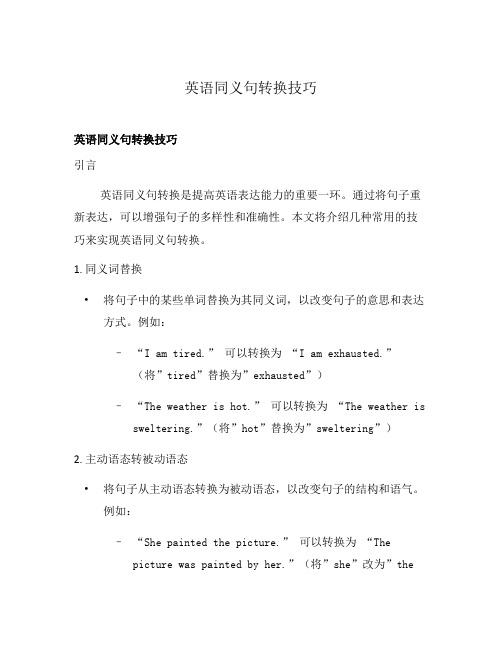
英语同义句转换技巧英语同义句转换技巧引言英语同义句转换是提高英语表达能力的重要一环。
通过将句子重新表达,可以增强句子的多样性和准确性。
本文将介绍几种常用的技巧来实现英语同义句转换。
1. 同义词替换•将句子中的某些单词替换为其同义词,以改变句子的意思和表达方式。
例如:–“I am tired.” 可以转换为“I am exhausted.”(将”tired”替换为”exhausted”)–“The weather is hot.” 可以转换为“The weather is sweltering.”(将”hot”替换为”sweltering”)2. 主动语态转被动语态•将句子从主动语态转换为被动语态,以改变句子的结构和语气。
例如:–“She painted the picture.” 可以转换为“Thepicture was painted by her.”(将”she”改为”thepicture”,将”painted”改为”was painted”,加上”by her”)3. 句子结构调整•改变句子的结构和语序,以达到同义句的目的。
例如:–“I saw him in the park.”可以转换为“In the park,I saw him.”(将”in the park”移到句首)–“The cat caught the mouse.” 可以转换为“Caught by the cat, the mouse.”(将”the cat”和”themouse”的位置互换)4. 词性转换•改变单词的词性,以实现同义句转换。
例如:–“She runs fast.” 可以转换为“She is a fastrunner.”(将”run”改为”runner”,加上”is a”)–“He is very strong.” 可以转换为“His strength is remarkable.”(将”strong”改为”strength”和”remarkable”)5. 句型转换•改变句子的结构或句型,以达到同义句的目的。
巧解同义句转换题的十法
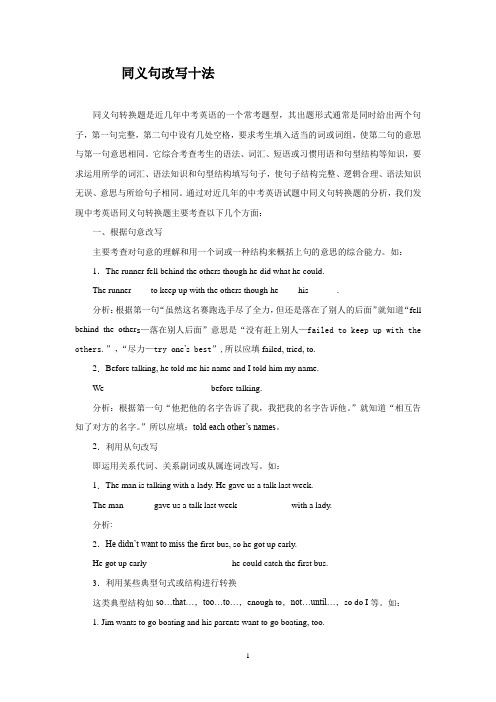
同义句改写十法同义句转换题是近几年中考英语的一个常考题型,其出题形式通常是同时给出两个句子,第一句完整,第二句中设有几处空格,要求考生填入适当的词或词组,使第二句的意思与第一句意思相同。
它综合考查考生的语法、词汇、短语或习惯用语和句型结构等知识,要求运用所学的词汇、语法知识和句型结构填写句子,使句子结构完整、逻辑合理、语法知识无误、意思与所给句子相同。
通过对近几年的中考英语试题中同义句转换题的分析,我们发现中考英语同义句转换题主要考查以下几个方面:一、根据句意改写主要考查对句意的理解和用一个词或一种结构来概括上句的意思的综合能力。
如:1.The runner fell behind the others though he did what he could.The runner ____to keep up with the others though he ____his ______.分析:根据第一句“虽然这名赛跑选手尽了全力,但还是落在了别人的后面”就知道“fell behind the other s—落在别人后面”意思是“没有赶上别人—failed to keep up with the others.”,“尽力—try one’s best”,所以应填failed, tried, to.2.Before talking, he told me his name and I told him my name.We _____ _____ ______ ______ before talking.分析:根据第一句“他把他的名字告诉了我,我把我的名字告诉他。
”就知道“相互告知了对方的名字。
”所以应填:told each other’s names。
2.利用从句改写即运用关系代词、关系副词或从属连词改写。
如:1.The man is talking with a lady. He gave us a talk last week.The man ______ gave us a talk last week ______ _____ with a lady.分析:2.He didn’t want to miss the first bus, so he got up early.He got up early _________ _________ he could catch the first bus.3.利用某些典型句式或结构进行转换这类典型结构如so…that…,too…to…,enough to,not…until…,so do I等。
初中英语同义句转换,知识点
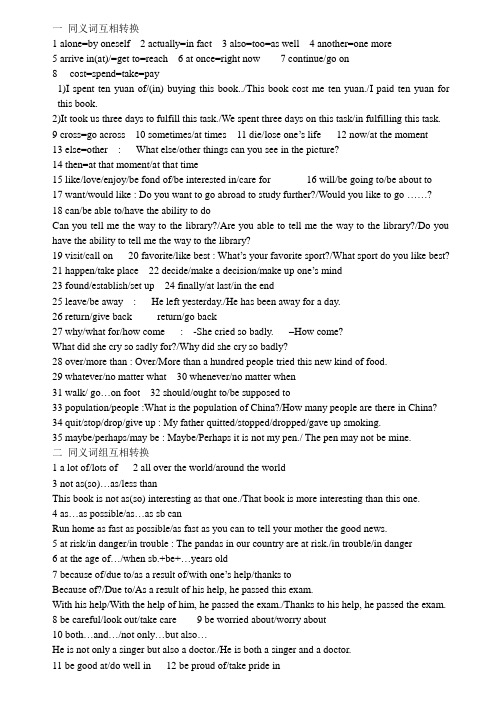
一同义词互相转换1 alone=by oneself2 actually=in fact3 also=too=as well4 another=one more5 arrive in(at)/=get to=reach6 at once=right now7 continue/go on8cost=spend=take=pay1)I spent ten yuan of/(in) buying this book../This book cost me ten yuan./I paid ten yuan for this book.2)It took us three days to fulfill this task./We spent three days on this task/in fulfilling this task.9 cross=go across 10 sometimes/at times 11 die/lose one’s life 12 now/at the moment13 else=other : What else/other things can you see in the picture?14 then=at that moment/at that time15 like/love/enjoy/be fond of/be interested in/care for 16 will/be going to/be about to17 want/would like : Do you want to go abroad to study further?/Would you like to go ……?18 can/be able to/have the ability to doCan you tell me the way to the library?/Are you able to tell me the way to the library?/Do you have the ability to tell me the way to the library?19 visit/call on 20 favorite/like best : What’s your favorite sport?/What sport do you like best?21 happen/take place 22 decide/make a decision/make up one’s mind23 found/establish/set up 24 finally/at last/in the end25 leave/be away : He left yesterday./He has been away for a day.26 return/give back return/go back27 why/what for/how come : -She cried so badly. –How come?What did she cry so sadly for?/Why did she cry so badly?28 over/more than : Over/More than a hundred people tried this new kind of food.29 whatever/no matter what 30 whenever/no matter when31 walk/ go…on foot 32 should/ought to/be supposed to33 population/people :What is the population of China?/How many people are there in China?34 quit/stop/drop/give up : My father quitted/stopped/dropped/gave up smoking.35 maybe/perhaps/may be : Maybe/Perhaps it is not my pen./ The pen may not be mine.二同义词组互相转换1 a lot of/lots of2 all over the world/around the world3 not as(so)…as/less thanThis book is not as(so) interesting as that one./That book is more interesting than this one.4 as…as possible/as…as sb canRun home as fast as possible/as fast as you can to tell your mother the good news.5 at risk/in danger/in trouble : The pandas in our country are at risk./in trouble/in danger6 at the age of…/when sb.+be+…years old7 because of/due to/as a result of/with one’s help/thanks toBecause of?/Due to/As a result of his help, he passed this exam.With his help/With the help of him, he passed the exam./Thanks to his help, he passed the exam.8 be careful/look out/take care 9 be worried about/worry about10 both…and…/not only…but also…He is not only a singer but also a doctor./He is both a singer and a doctor.11 be good at/do well in 12 be proud of/take pride in13 come up with/think of/have an idea 14 ride a bike/go…by bike15 come from/be from 16 have a good time/enjoy oneself//play happily17 have a pain in head/have a headache18 hear from/receive(get) a letter from19 had better do/It’s best to do :You had better read in the sun./It’s best for you to read in the sun.20 how about/what about/why not : How about/What about going skating?21 in order to/in order that/to do/so thatHe worked day and night to be a successful man./He worked day and night in order to be a successful man./He worked day and night in order that he could be a successful man./He worked day and night so that he could be a successful man.22 keep off/keep away from : Keep off /Keep away from the grass!23 in/wear : She is in/wears a white dress today.24 keep sb. from doing/stop sb. (from) doing/prevent sb. (from) doingTrees can stop the soil flowing away./ Trees can prevent the soil flowing away./Trees can keep the soil from flowing away.25 learn …by oneself/ teach oneselfNobody taught him. He learnt it by himself./He taught himself.26 like …better than/prefer…to…/prefer to do…rather than do …John likes swimming better than skating./John prefers swimming to skating./John prefer to swim rather than skate.27 long, long ago/once upon a time 28 look after well/take good care of29 no longer/not …any longer : She is no longer a little girl./She is not a little girl any longer.30 shall we/Let’s.. : Shall we watch the film together?/Let’s watch the film together.31 take part in/join in/participate in32 too…to/so…that…/not…enough to…He is too busy to visit us./He is so busy that he can’t visit us./He is not free enough to visit us.三同义句型互相转换1运用两种时态(一般过去时和现在完成时互相转换)(1)He left last year.(2)He has been away for one year.(3)He has been away since a year ago.(4)It is a year since he left.(5)One year has passed since he left.2最高级和比较级的互相转换(1)He is the tallest student in his class.(2)He is taller than any other student in his class.(3)He is taller than the other students in his class.(4)No one else is taller than him in his class.3运用两种语态(主动语态和被动语态互相转换)4感叹句的两种句型之间互相转换What a careful girl she is!/How careful the girl is!5运用关联词语合并句子(1)Amy can’t dance. Susan can’t, either.Neither Amy nor Susan can dance.(2)I has eaten breakfast and my mother has eaten it, too.Both my mother and I have eaten breakfast.6运用复合句和不定式互相转换(1)I hope that I can visit the moon one day./I hope to visit the moon one day.(2)He told me how he could use a computer./He told me how to use a computer.7运用不同的句式结构互相转换(1)She wants to go shopping and her friends want to go shopping, too./She wants to goshopping, and so do her friends.(2)He went to bed after he finished his homework./He went to bed after finishing hishomework./He didn’t go to bed until he finished his homework.(3)Come on, or we’ll miss the early bus./If we don’t hurry, we’ll miss the early bus.(4)The man gave us a talk last week, and he will give us another talk this week./The man whogave us a talk last week will give us another talk this week.8用it做形式主语互相转换(1)He can finish the work easily./It is easy for him to finish the work.(2)We found it hard to shake./We found it was hard to skate.四实战演练1People everywhere sat and laughed at them until the tears ran down their faces.People ______ and _______sat and laughed at them until the tears ran down their faces.2Fred was visiting his mother on her 95th birthday.Fred was visiting his mother _______ she was ______ years old.3She lives alone.She lives ________ __________.4 Due to the way they eat, they have a high rate of cancer and heart disease.________ ________ the way they eat, they have a high rate of cancer and heart disease.5 But it took her a long time to find out.But she ______ a long time _______ out.6 Ten years later, Tom became a strong boy and became a good swimmer, too.Ten years later, Tom became _______a strong boy ________ a good swimmer.7 Shy people are also good at working with others because they think more for other people. She people also ________ ______ in working with others because they think more for other people.8 Mark decided to go sailing in his boat with his friend Dan.Mark _______ a ________ to go sailing in his boat with his friend Dan.9 Once there was something wrong with a machine in a factory.Once a machine in a factory ________ __________.10 When parents have poor eating habits, their children usually do, too.When parents have poor eating habits, _______ ________ their children.11 In the computer game houses, it takes people a lot of money competing with the machines.People _____ ______ money in competing with the machines in the computer games houses.12 When the local police began to look for the pigs, newspaper reporters from around the country joined them.When the local police began to look for the pigs, newspaper reporters from ________ _______ the country joined them.13 When he first reached the island, he didn’t know what he could find in this strange place. When he first _________ _______ the island, he didn’t know what he could find in this strange place.14 Some dentists say that chewing sugarless gum can help take care of people’s teeth.Some dentists say that chewing sugarless gum can help ________ ________ people’s teeth.15 He was different from other children.He was _______ the ______ as other children.16 Bob is twice as old as Jack, so he is now thirty.Jack is _______ years ________ than Bob.17 I teach something to air hostesses.Air hostesses ________ something _______ me.18 The world is full of variety.The world is ________ _________ variety.19 To his surprise, the taste was nice.He was ______ ______ the taste was nice.20 Once in the area, a car s almost a must.You _______ ______ take a car in the area.21 But when you are joined to the Internet, there are many things you can do.But when you are joined to the Internet, there are _________ _______ things you can do.22 Beijing will be rainy.There will be _______ ________ Beijing.23 Mrs Smith and her friends worked hard and the idea was interesting to more and more people over the country.Mrs Smith and her friends worked hard and more and more people over the country became ___________ _______ the idea.24 But now there is a Winter Swimming Club and it has over 2,000 members.But now there is a Winter Swimming Club and it has _________ ________ 2,000 members.25 Before crossing the road, stop and look both ways.Before ______ _______ the road, stop and look both ways.26 We call this mark “watermark”.This mark ____ ____ “watermark”.27 They hoped the government would act quickly to conserve nature.They hoped the government would act quickly _______ _______ to conserve nature.28 The Komodo lizard is the world’s largest lizard.The Komodo lizard is larger than ______ _____ lizard in the world.29 We haven’t done anything to improve the exam system.We have _______ _______ to improve the exam system.30 It is much harder to do it with TV or radio advertisements.It is much ______ ________ to do it with TV or radio advertisements.31 He was unable to walk any more.He ______ _______ walked.32 The bookshelf was too heavy for Miss Green to carry.The bookshelf was _____ heavy ______ Miss Green didn’t carry it.33 In order to solve this population problem, China has begun a “one-child’ policy. China has begun a “one-child” policy ______ ________ it solved this population problem.34 He scored more goals than anyone else on his team.He scored _______ _______ goals on his team.35 He spent very little time at school, perhaps no more than a year in all.It _______ _______ very little time at school, perhaps no more than a year in all.36 A school inspector was coming to visit a school.A school inspector was _____ a visit _____ a school.37 Why not look at the funny side and laugh instead?_________ ________ you look at the funny side and laugh instead?38 Good movies are the ones that you remember and like to see another time.Good movies are the ones that you remember and like to see ________ than _______.39 Many public people use web blogs to express their thoughts.Many public people use web blogs ________ ________ their thoughts.40 I think maybe it was left on the shelf in the bedroom.I think it _______ _____ left on the shelf in the bedroom.41 Both my father and my mother came from towns in Mexico.Both of _____ _______ came from towns in Mexico.42 When Bloom was 16, he moved to London.At the _______ _____ 16, Bloom moved to London.43 I was born in Amsterdam and lived there for many years.I ________ ______ in Amsterdam.44 Nobody had ever seen such a big orange.Nobody had ever seen _____ big ________ orange.45 Sometimes she only sleeps for no more than four hours.________ ________ she only sleeps for no more than four hours.46 She bought me many presents.She bought many presents ______ ______.47 The winter will be full of happiness by your own hands.The winter will be ______ ________ happiness by your own hands.48 They all agreed with me.They all ______ yes ________ me.49 Beautiful flowers need pollinating.Beautiful flowers need _______ _______ pollinated.50 The girl smiled sweetly, so he felt very happy.The _____ smile of the girl ______ him very happy.51 I don’t like growing flowers. Mary doesn’t like growing flowers, either._______ I ______ Mary likes growing flowers.52 Giving makes people happy, not only those who receive, but also those who give. Giving makes people happy, ________ those who receive _______ those who give.53 Your promises are too big, and then they won’t be able to win people’s trust. Your promises are ______ big ___ be able to win people’s trust.54 What a serious thing a promise is!_________ _______ a promise is!55 They only want to win.They want _______ _______ to win.56 The better you get along with others, the easier it is for you to succeed.Get along _______ with others and that helps you succeed ______.57 It was stuck and he couldn’t talk or breathe.It was stuck and he could _______ talk ______ breathe.58 What do you think of the music?_______ do you ________ the music?59 I am 190cm and Jenny is 190cm, too.Jenny is ______ tall _____ I.60 How about playing basketball with us?________ ________ playing basketball with us?61 Mary and Tom donated money to the poor children.62 The rain was heavy yesterday.It ______ _______ yesterday.63 I hope that I can visit the moon some day.I hope ________ _______ the moon some day.64 Jenny’s grandmother died two years ago.Jenny’s grandmother ______ been ______ for two weeks.65 He can finish the work easily.66 He got up so late that he couldn’t catch the bus.He got up ________ ________ ________ catch the bus.67 Walking after meals is very helpful._______ is very helpful _______ walk after meals.68 Actually, we have been friends for long.________ _______, we have been friends for long.69 My coat is similar to yours in many ways.Our coats have a lot _______ ________.70 Mother takes care of you as much as possible.Mother _______ ________ you as much as possible.71 However, experts say that the tea does not have relation to Tibet.However, experts say that the tea has _______ to _______ with Tibet.72 I’m supposed to do some homework this weekend.I _______ ________ some homework this weekend.73 She was glad she kept her promise.She was glad _________ ________ her promise.74 The princess told the frog to leave.The frog ______ told ________ leave by the princess.75 We had a great time going on a picnic.We _______ ________ going on a picnic.76 I shall do whatever you please.I shall do ______ ________ what you please.77 I’m from China.My _________ is _________.78 How long is the classroom?_________ is the _______ of the classroom?79 I am the owner of the dictionary.The dictionary ________ _________ me.80 I’m looking forward to seeing her again.I _______ ________ see her again.答案:1 here, there 2 when, 95 3 by herself 4 Because, of 5 spent, finding 6 both, and 7 do, well 8 made, decision 9 didn’t, work 10 so, do 11 spend, much 12 all, over 13 got, to 14 look, after 15 not, same 16 fifteen, younger 17 learns, from 18 filled, with 19 surprised, at 20 have, to 21 lots, of 22 much, rain 23 interested, in 24 More, than 25 going across 26 is called 27 in order 28 any other 29 done, nothing 30 more, difficult 31 no, more 32 so, that 33 so, that 34 the, most35 took, him 36 on, to 37 Why, don’t 38 more, once 39 for, expressing 40 may, be 41 my, parents 42 age, of 43 grew, up 44 so, an 45 At, times 46 for, me 47 filled, with 48 said, to 49 to, be 50 sweet, made 51 Neither, nor 52 both, and 53 too, to 54 How, serious 55 nothing, but 56 well, easily 57 neither, nor 58 How, like 59 as, as 60 What, about 61 Not only, but also 62 rained, heavily 63 to, visit 64 has, dead 65 easy, to 66 too late to 67 It, to 68 In, fact 69 in, common 70 looks, after 71 nothing, do 72 should, do 73 to, keep 74 was, to 75 enjoyed, ourselves 76 no. matter 77 nationality, Chinese 78 What, length 79 belongs, to 80 expect, to。
初中英语同义句转换的九种类型
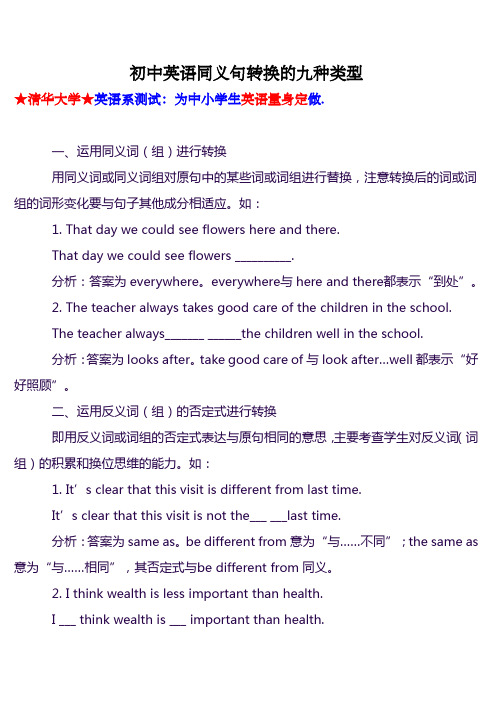
初中英语同义句转换的九种类型★清华大学★英语系测试:为中小学生英语量身定做.一、运用同义词(组)进行转换用同义词或同义词组对原句中的某些词或词组进行替换,注意转换后的词或词组的词形变化要与句子其他成分相适应。
如:1. That day we could see flowers here and there.That day we could see flowers __________.分析:答案为everywhere。
everywhere与here and there都表示“到处”。
2. The teacher always takes good care of the children in the school.The teacher always_______ ______the children well in the school.分析:答案为looks after。
take good care of与look after…wel l都表示“好好照顾”。
二、运用反义词(组)的否定式进行转换即用反义词或词组的否定式表达与原句相同的意思,主要考查学生对反义词(词组)的积累和换位思维的能力。
如:1. It’s clear that this visit is different from last time.It’s clear that this visit is not the___ ___last time.分析:答案为same as。
be different from意为“与……不同”;the same as 意为“与……相同”,其否定式与be different from同义。
2. I think wealth is less important than health.I ___ think wealth is ___ important than health.分析:答案为do n’t,more。
初中英语同义句转换的九种类型

中考英语同义句转换题主要考查以下几个方面:一、运用同义词(组)进行转换用同义词或同义词组对原句中的某些词或词组进行替换,注意转换后的词或词组的词形变化要与句子其他成分相适应。
如:1. That day we could see flowers here and there.That day we could see flowers __________.答案:everywhere解析:everywhere与here and there都表示“到处”。
2. The teacher always takes good care of the children in the school.The teacher always______ _____the children well in the school.答案:looks after解析:take good care of与look after…well都表示“好好照顾”。
二、运用反义词(组)的否定式进行转换即用反义词或词组的否定式表达与原句相同的意思,主要考查学生对反义词(词组)的积累和换位思维的能力。
如:1. It’s clear that this visit is different from last time.It’s clear that this visit is not the___ ___last time.答案:same as解析:be different from意为“与……不同”;the same as意为“与……相同”,其否定式与be different from同义。
2. I think wealth is less important than health.I ___ think wealth is ___ important than health.答案:为don’t,more解析:less important的意思是“没有(不及)……重要”;more important的意思是“(比)……更重要”,该结构与not连用,则表示“不比……更重要”。
初中英语同义句转换(方法)

初中英语同义句转换1、陈述句中肯定句变为否定句,大部分是用not来改变谓语结构,但也有借用否定意义的词,如nothing, nobody, none, neither, little, few, never, hardly等,例如::A:Tom does well in maths. B:Tom doesn’t do well in maths.A:He has much to do. B:He has nothing to do.A:All of my classmates like art. B:None of my classmates likes art.2、改为疑问句。
根据上下句的结构和词的减少,来判断变为哪一种形式的疑问句。
例如:A:My brother often has breakfast at school. B:Does your brother often have breakfast at school?A:Tom’s already weak in English. B:Tom’s already weak in English, isn’t he ?A:The red light changes every two minutes. B:How often does the red light change?3、改为感叹句。
根据所给的句子结构和单词的词性,来确定使用哪一种感叹句的形式,例如:A:This is an interesting book. B:What an interesting book this is! 或How interesting this book is!1、同义词或词组之间的转换。
(通常上下句时态保持一致)。
常见的同义词或词组有:1. “花费”spend-take-cost-take;2. “到达”get to-reach-arrive in/at;3. “收到…来信”hear from-geta letter from-receive a letter from-have a letter from4. “擅长于…”be good at -do well in5. “有空”be free-have time;6. “入睡”go to sleep-get to sleep-fall asleep;(7) “玩得开心”enjoy oneself-have a good time;(8)“给…打电话”call sb-telephone sb-ring sb. a call-make a telephone to sb.(9)“飞往…”fly to…-go to…by air/plane(10)“自学”teach oneself-learn…by oneself(11)在…方面帮助help…with…-help… (to)do…(12)在…差be weak in…-do badlyin…(13)能/会…c an-be able to更喜欢…like…better than…-prefer…to…(15)充满了…be full of…-be filled with…(16)放弃干…give up doing…-stop doing…(17)不再… no longer-not …any longer(18)照顾/保管take care of…-look after(19)展览on show-on display(20)阻止…干…stop…from doing-keep/prevent…from doing…(21)由于thanks to-becauseof…(22)举手hands up-put up one’s hands(23)最后,终于at last-in the end(24)与…不同bedifferent from…-be not thesame as…(25)从…借入… borrow…from…-lend…to…(26)乘公汽/火车/的go to…by bus/train/taxi-take a bus /train to(27)乘自行车去… go to…by bike-rid e a bike to…(28)为…感到自豪be proud of…-be the pride of…(29)步行去… walk to…-go to…on foot (30)独自地by oneself -alone等。
初中英语同义句转换方法1
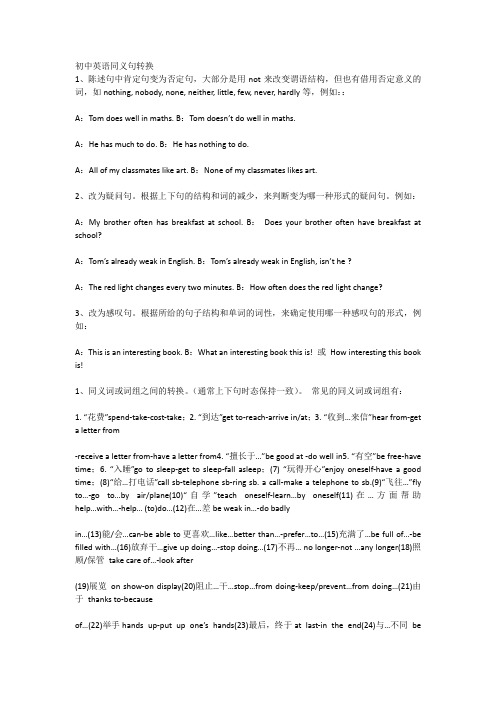
初中英语同义句转换1、陈述句中肯定句变为否定句,大部分是用not来改变谓语结构,但也有借用否定意义的词,如nothing, nobody, none, neither, little, few, never, hardly等,例如::A:Tom does well in maths. B:Tom doesn’t do well in maths.A:He has much to do. B:He has nothing to do.A:All of my classmates like art. B:None of my classmates likes art.2、改为疑问句。
根据上下句的结构和词的减少,来判断变为哪一种形式的疑问句。
例如:A:My brother often has breakfast at school. B:Does your brother often have breakfast at school?A:Tom’s already weak in English. B:Tom’s already weak in English, isn’t he ?A:The red light changes every two minutes. B:How often does the red light change?3、改为感叹句。
根据所给的句子结构和单词的词性,来确定使用哪一种感叹句的形式,例如:A:This is an interesting book. B:What an interesting book this is! 或How interesting this book is!1、同义词或词组之间的转换。
(通常上下句时态保持一致)。
常见的同义词或词组有:1. “花费”spend-take-cost-take;2. “到达”get to-reach-arrive in/at;3. “收到…来信”hear from-geta letter from-receive a letter from-have a letter from4. “擅长于…”be good at -do well in5. “有空”be free-have time;6. “入睡”go to sleep-get to sleep-fall asleep;(7) “玩得开心”enjoy oneself-have a good time;(8)“给…打电话”call sb-telephone sb-ring sb. a call-make a telephone to sb.(9)“飞往…”fly to…-go to…by air/plane(10)“自学”teach oneself-learn…by oneself(11)在…方面帮助help…with…-help… (to)do…(12)在…差be weak in…-do badlyin…(13)能/会…c an-be able to更喜欢…like…better than…-prefer…to…(15)充满了…be full of…-be filled with…(16)放弃干…give up doing…-stop doing…(17)不再… no longer-not …any longer(18)照顾/保管take care of…-look after(19)展览on show-on display(20)阻止…干…stop…from doing-keep/prevent…from doing…(21)由于thanks to-becauseof…(22)举手hands up-put up one’s hands(23)最后,终于at last-in the end(24)与…不同bedifferent from…-be not thesame as…(25)从…借入… borrow…from…-lend…to…(26)乘公汽/火车/的go to…by bus/train/taxi-take a bus /train to(27)乘自行车去… go to…by bike-rid e a bike to…(28)为…感到自豪be proud of…-be the pride of…(29)步行去… walk to…-go to…on foot (30)独自地by oneself -alone等。
- 1、下载文档前请自行甄别文档内容的完整性,平台不提供额外的编辑、内容补充、找答案等附加服务。
- 2、"仅部分预览"的文档,不可在线预览部分如存在完整性等问题,可反馈申请退款(可完整预览的文档不适用该条件!)。
- 3、如文档侵犯您的权益,请联系客服反馈,我们会尽快为您处理(人工客服工作时间:9:00-18:30)。
初中英语同义句转换精析1. 同义句转换题是近几年来中考英语试题的常见题型之一。
该题型能够全面考查学生灵活运用英语的能力,要求学生反应敏捷,联想丰富,能用不同的句子或短语来表达同一意义。
本文就同义句转换题的特点及转换形式进行分析,希望从中帮助同学们找出规律,提高其应试能力。
2. Eg.People were in a hurry to take the sick man to hospital.(写出同义句)People _______ _______ take the sick man to hospital.People hurries to take the sick man to hospital.同义句转换的实质就是替代、合并和改写句子。
具体分析如下:一:替代1、用一个新的词、短语替代原句中有关部分。
如:①I received a letter from Lucy .= I heard from Lucy . (receive a letter from → hear from )②I often walk to school every day .= I often go to school on foot . (walk → go on foot )③She decided to stop learning English .= She decided to give up English . (stop doing sth. → give up doing sth. )2、用反义词来替代。
如:3、④We are in different rows . = We aren’t in the same row . (different → same )4、⑤My bike is cheaper than yours . = Your bike is more expensive than mine . ( cheap → expensive ) 用反义词或反义短语来替换时,一般会有一个否定意义的词,如not , less , no , never , hardly 等。
二:合并句子合并句子一般是通过并列连词将两个简单句合并为一句。
常见的并列连词有:not only … but also , both … and , neither …nor, either … or 等。
例如:⑥Mary didn’t go to the park . I didn’t, either .= Neither Mary nor I went to the park .⑦Wei Hua may go to the cinema , or Ann may because there is only one ticket .= Either Wei Hua or Ann may go to the cinema because there is only one ticket .⑧John has got a penfriend . Mike has got a penfriend , too .= Not only John but also Mike has got a penfriend .= Both John and Mike have got penfriends .三:改写句子通过能够表达同一意义的不同句型、句式、语态的转换,来达到改写句子的目的。
具体可分为:1、复合句改为简单句。
含宾语从句的复合句变简单句时,可用不定式改写,将宾语从句中的谓语动词变为不定式。
如:⑨We all agree that we should leave at once .= We all agree to leave at once .⑩Could you tell me when we will start ?= Could you tell me when to start ?含宾语从句的复合句变简单句时,还可用复合宾语,即宾语加宾语补助语来改写。
如:1. I saw he went into the room just now .= I saw him go into the room just now .2. Edison’s mother found that he was a clever boy .= Edison’s mother found him clever .We heard that she was singing in English .= We heard her singing in English .2、含状语从句的复合句变简单句时,常用以下方法:以so…that引导的结果状语从句常转换为too … to 或enough to 结构。
如:He is so young that he can’t go to school .= He is too young to go to school .= He isn’t old enough to go to school .另外还可通过结构和语态的转换来改写。
如:I can’t finish the work if you don’t help me .= I can’t finish the work without your help .= I can’t finish the work unless you help me .We use computers in many ways . = Computers are used in many ways .3、句型间的转换,要求对能够表达同一意义的常用句型结构了解甚透。
如:It took me two hours to finish my homework .= I spent two hours in finishing my homework .If you don’t hurry , you will be late . = Hurry up , or you’ll be late .4、还可利用词性转换来改写。
如:There was a heavy snow here last night .= It snowed heavily here last night . Uncle Wang invented the machine .= Uncle Wang was the inventor of the machine .四:热身练习:1. (A) It’s good for your health to do exercise often .(B) _____ exercise often can make you _____ .2. (A) This picture looks the same as that one .(B) _____ _____ ______ ______ the two pictures .3. (A) Tom is taller than any other student in his class .(B) Tom is _____ _____ in his class .4. (A) I’ll go to bed after I finish my homework .(B) I _____ go to bed _____ I finish my homework .5. (A) Cross the bridge , you will find the building .(B) ____ _____ the bridge , you’ll find the building .6. (A) My father went to Beijing last year . He is still there now .(B) My father ______ _____ _____ Beijing ______ last year .7. (A) It’s a long time since we wet last .(B) We _____ _____ each other for a long time since we wet last .8. (A) He wrote the book in 2000.(B) The book _____ _____ by ____ in 2000.9. (A) Lucy was born on March 5 , 1989 , so was Lily .(B) Lucy is _____ _____ _____ Lily .10. (A) We can hardly decide what we shall do next .(B) ______ ______ for us to decide what ____ ____ next .11. (A) He doesn’t like singing . He doesn’t like dancing , either .(B) He likes _____ singing _____ dancing .12. (A) The light in the room was so weak that the doctor wasn’t able to operate .(B) The doctor _____ do the _____ _____ such bad light inside the room .13. (A) It was very hot last night . I could hardly sleep .(B) It was _____ hot last night ____ I could hardly sleep .14. (A) Bill Gates knows much about computers .(B) Bill Gates _____ a lot of ______ of computers .15. (A) One day the librarian had an idea .(B) One day the librarian _____ _____ ______ an idea .16. (A) We are so happy that we can’t say a word .(B) We are ____ happy _____ say _____ .17. (A) Have you ever been abroad ?(B) Have you ever been to any _____ _____ ?18. (A) The old man died two years ago .(B) The old man _____ ______ ______ ______ two years .19. (A) Both Mary and Ann passed the exam .(B) ______ Mary nor Ann ______ the exam .20. (A) Chinese is less popular than English .(B) Chinese isn’t_____ popular _____ English .21. (A) They spent two hours on the experiment .(B) It _____ ______ two hours _____ _____ the experiment .22. (A) That’s not an interesting film , I think .(B) I _____ think that _____ an interesting film .23. (A) Mr. Smith was once an English teacher .(B) Mr. Smith ______ _____ be an English teacher .24. (A) How is the weather today ?(B) ______ the weather _____ today ?25. (A) He spent 500 yuan on the bicycle .(B) The bicycle ______ ______ 500 yuan .26. (A) Each of them has an apple .(B) They _____ an apple _____ .27. (A) We use knives to cut things .(B) Knives _____ ______ ______ _____ things .28. (A) Li Lei jumped farthest in our class .(B) In our class _____ jumped so far ____ Li Lei .29. (A) He has lived here since he was born .(B) He has lived here _____ _____ _____ .30. (A) When he was three , he could read and write .(B) _____ the _____ of three , he could read and write .31. (A) This coat is too big for me . That coat is too small for me .(B) The coats are _____ too big _____ too small for me .32. (A) If you don’t think hard , you won’t find the answer .(B) _____ _____ , ______ you won’t find the answer .33. (A) Lucy’s parents are very proud of their daughter .(B) Lucy is _____ ______ ______ her parents .34. (A) The film is the most interesting one that I have ever seen .(B) I have _____ seen _____ an interesting film before .35. (A) Bike is short for bicycle .(B) Bike is another way _____ _____ bicycle .36. (A) When I got there , I found he was lying on the ground .(B) When I got there , I found _____ _____ on the ground .37. (A) We have had no holiday for about one month .(B) We haven’t had a _____ _____ for about one month .38. (A) It’s hard to stop smoking in a short time .(B) It’s hard to _____ _____ smoking in a short time .39.(A) My brother joined the PLA a year ago .(B) My brother _____ _____ a _____ for a year .40.(A) The factory has been open for half a year .(B) ______ half a year _____ the factory _____ .41. (A) She walks slowest of the four .(B) She walks _____ than the _____ _____ .42. (A) Put the tree in the hole so that it is straight .(B) Put the tree in the hole ____ _____ it straight .43. (A) It was very late . Jim was still doing his lessons.(B) _____ it was very late , Jim still went _____ _____ his lessons .44. (A) Most of his questions were not about his lessons .(B) Most of his questions had ____ to _____ with his lessons .45. (A) They will go to Hong Kong by air next week .(B) They will _____ _____ Hong Kong next week .46. (A) My penfriends often write letters to me .(B) I often _____ ______ my penfriends .47. (A) Everyone is here except Wei Hua .(B) ______ Wei Hua ____ here .48. (A) I don’t want to eat anything .(B) I don’t_____ ______ eating anything .49. (A) Jim isn’t good at Chinese .(B) Jim _____ _____ _____ _____ Chinese .50.(A) How many people are there in Germany ?(B) _____ the ______ of Germany ?Key : 1.Doing healthy 2. There’s no difference between 3. the tallest 4. won’t until 5. Go across 6. has gone to since 7. haven’t seen 8. was written him 9. as old as 10. It’s hard to do 11. neither nor 12. couldn’t operation in 13. so that 14. has knowledge 15. came up with 16. too to anything 17. foreign countries 18. has been dead for 19. Neither failed 20. so as 21. took them to do 22. don’t is 23. used to 24. What’s like 25. cost him 26. have each 27. are used for cutting 28. Nobody as 29. all his life 30. At age 31. either or 32. Think hard or 33. the pride of 34. never such 35. of saying 36. him lying 37. month off 38. give up 39. has been soldier 40. It’s since opened 41. slower other three 42. to keep 43. Though on doing / with 44. nothing do 45. fly to 46. hear from 47 Only isn’t48. feel like 49. doesn’t do well in 50. What’s population。
